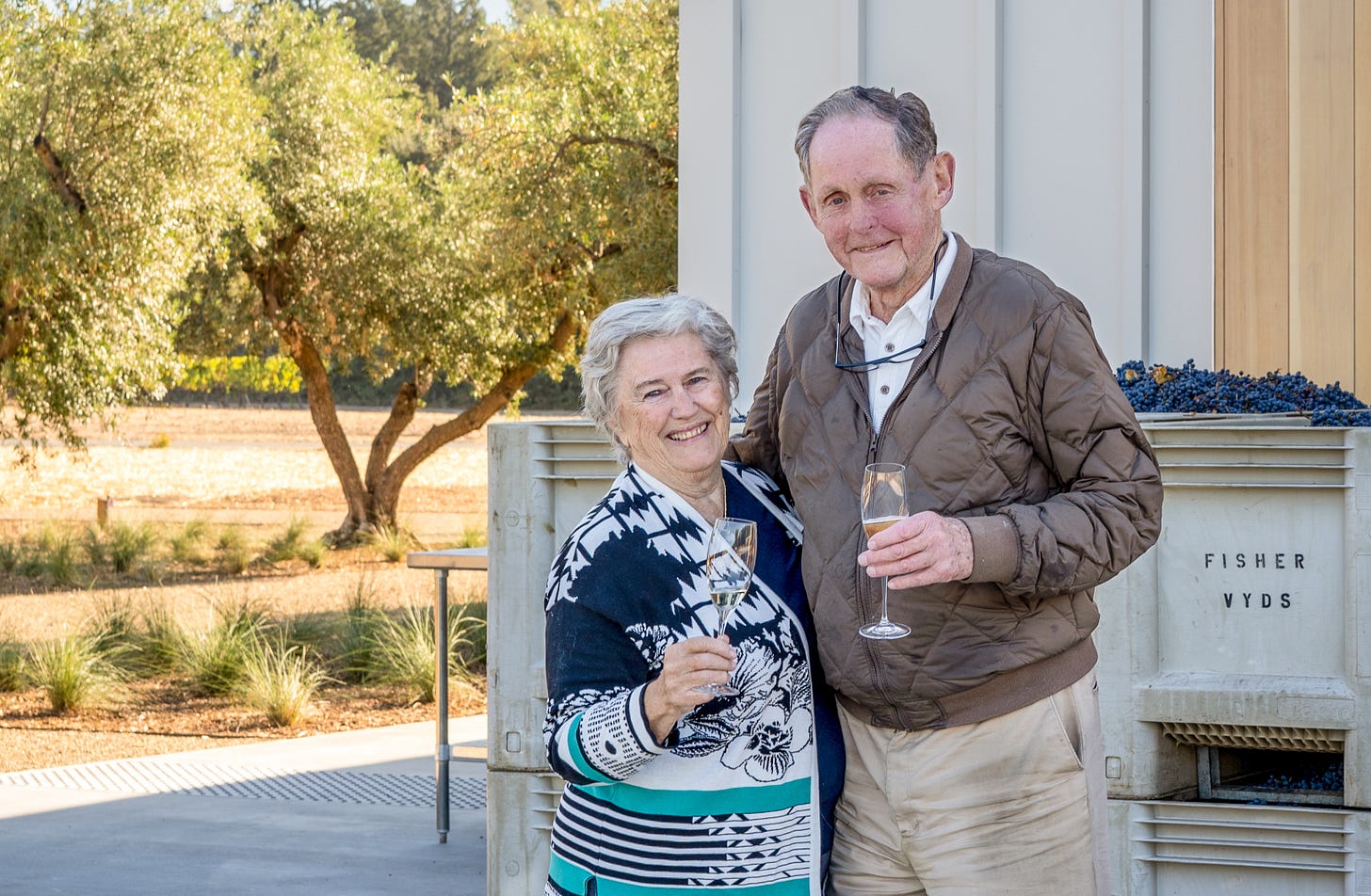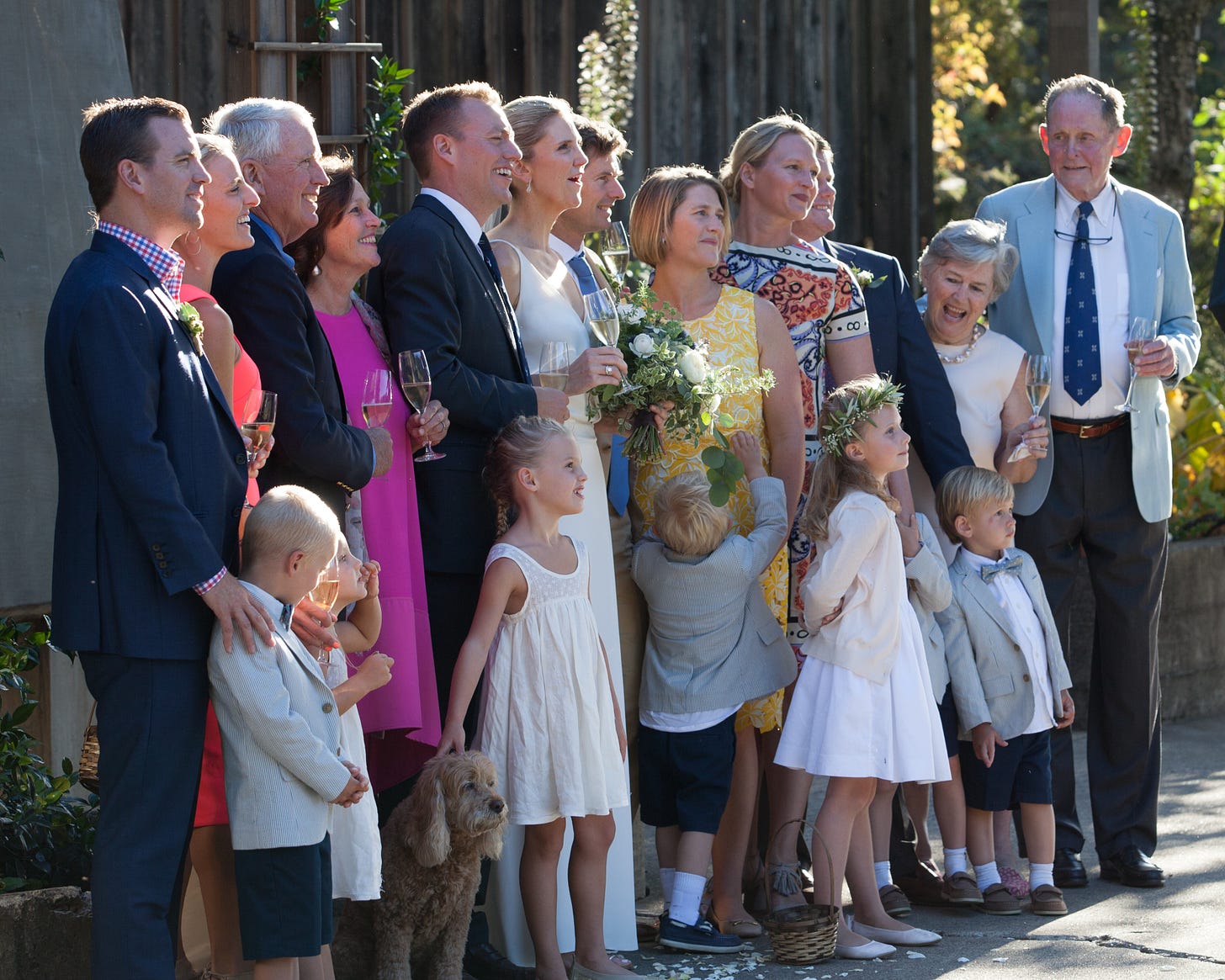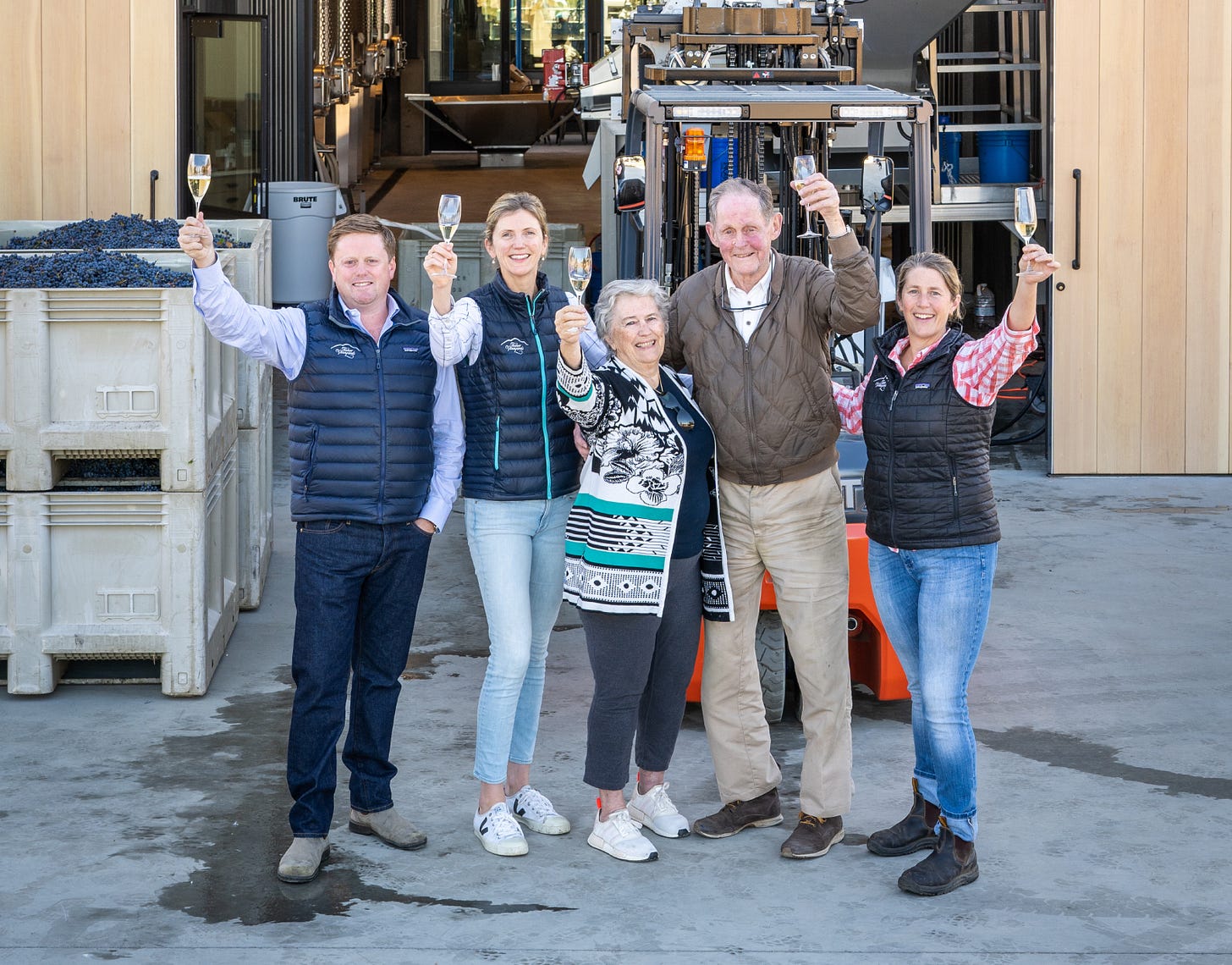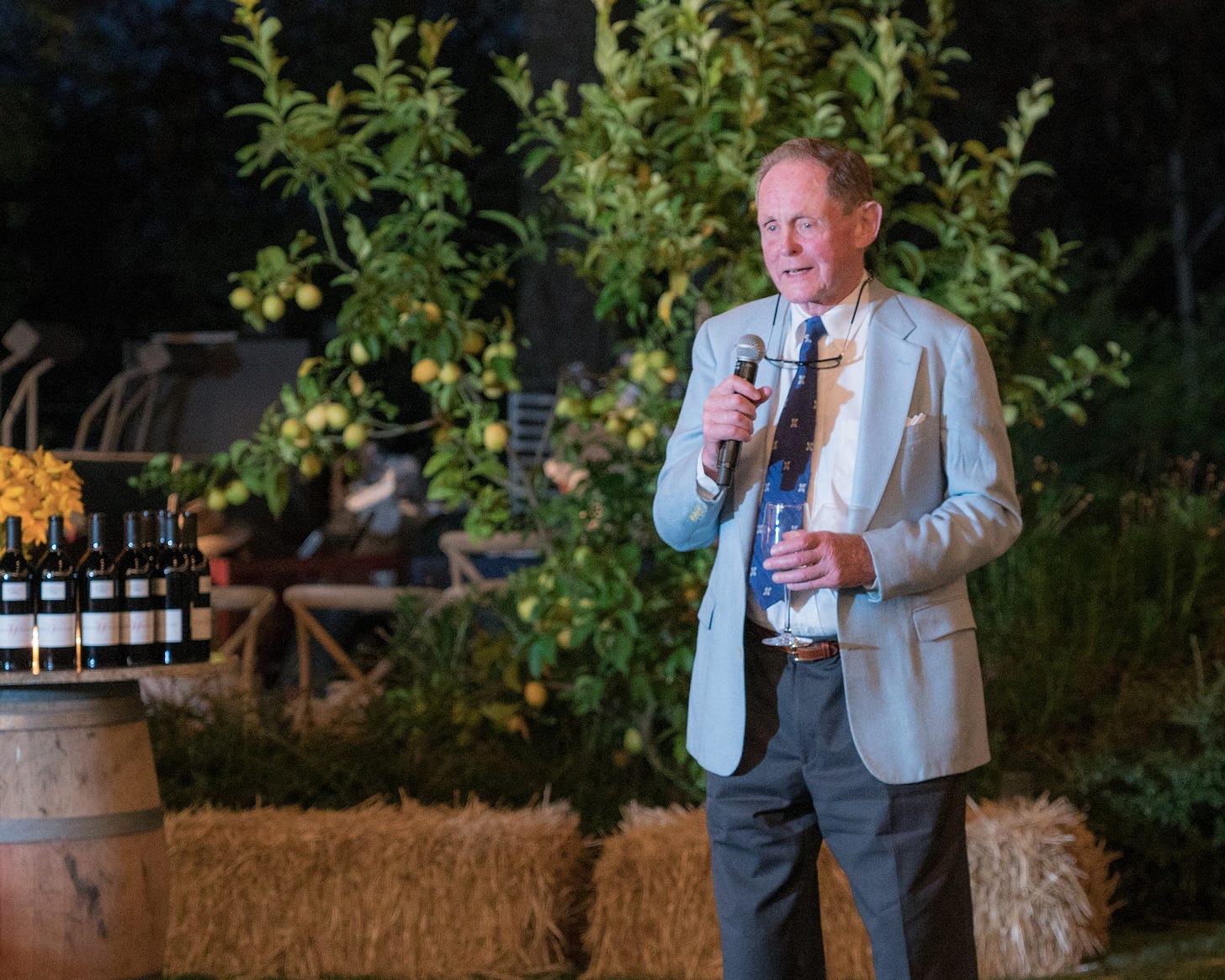Fred Fisher Has Died — A Quiet Force Behind a Family Legacy
For more than 50 years he helped build an estate rooted in land, family and farming. Fisher Vineyards remains one of the few second-generation, estate-grown family wineries bridging Napa and Sonoma.

NAPA VALLEY, Calif. — Fred Fisher, co-founder of Fisher Vineyards and a steady presence in the evolution of Napa’s and Sonoma’s wine growing culture, died in April 2025. He was 91.
For more than five decades, Fred and his wife, Juelle, helped build one of the region’s rarest institutions — a multigenerational, family-run winery rooted in mountain vineyards, agricultural clarity and a refusal to chase the spotlight.
I didn’t know Fred well, but I’ve known his family for years — photographing them, interviewing them for stories, enjoying their wines and watching as the second generation rose to the challenge of running one of the region’s most respected wineries. Over time it became clear that although Fred avoided the limelight — and often the camera — he was a quiet force. He and Juelle created something durable and true at a time when many others were still figuring out what Napa and Sonoma might become.
In the early 1970s, Fred and Juelle were part of a small group who took a chance on the rugged slopes of the Mayacamas. Not because it was fashionable or for attention, but because the land felt right — and farming it felt even more right. As Juelle once said, “There was just no question — the property was a perfect fit.” That kind of clarity shaped everything that followed.
Fred grew up in Detroit. His grandfather was one of the seven brothers behind the Fisher Body Co. — a key part of what became General Motors — but Fred was not drawn to corporate life. After studying engineering at Princeton, earning an MBA from Harvard and serving as an Army officer in Europe, he moved west. He worked as a consultant and later ran a shipping container leasing company in San Francisco. But it was the land — raw, remote and without water or power — that captured his imagination.

In 1973, Fred and Juelle purchased their Spring Mountain property and began the long physical labor of building a winery. Two years later they added a second vineyard in Napa Valley — a stretch of land running from the Palisades to the Napa River. Like their mountain property, it was chosen for its potential to grow expressive wines and sustain a future rooted in farming.
Fred was fully engaged in the work. He helped clear the land and insisted on building the original winery himself, using timber milled from the estate. To learn winemaking, he interned with Philip Togni at Cuvaison. When it came time to design the winery, they turned to what Juelle fondly called the “holy trilogy” — architect Bill Turnbull, builder Matt Sylvia and their friend Jack Cakebread. That barn-style structure still stands on Spring Mountain — modest, functional and beautiful in its simplicity.
Their first vintage was in 1979. The original plan had been to sell grapes, but Fred and Togni believed the fruit deserved more. Paul Hobbs served as winemaker and, following him, the winemaking team has included Mia Klein, Whitney Fisher and Aaron Pott. Adam Goodrich joined the team in 2010 and has served as winemaker since 2015. Still, the core of the operation has always been family.
Whitney, Robert and Cameron each left for college with plans to pursue careers elsewhere, but all three eventually returned. Whitney oversees vineyards and production as winegrower. Robert serves as CEO, overseeing the business. Cameron heads up marketing and hospitality. Their return wasn’t planned — but like the land itself, it felt right.
That continuity is increasingly rare. Independent family-run estate wineries that straddle both Sonoma and Napa have become harder to find. But that’s part of Fred’s legacy — not just in the wines but in how the family continues to care for the land, the business and each other.
In addition to their work in wine, Fred and Juelle were committed to education. In 1983, Juelle co-founded Sonoma Country Day School, a K–8 independent school, and Fred supported the effort throughout its early development. All three Fisher children attended the school, which remains an important part of the family’s legacy in Sonoma County.
Fred wasn’t loud. He didn’t grandstand. But those who knew him understood his focus, his values and the quiet sense of purpose that ran through everything he did.

In those early years, the Fishers found themselves among a tight-knit group of vintners helping define the region. Jack and Dolores Cakebread, Dan and Margaret Duckhorn and Bob Long were part of that early circle — a time Juelle described as full of “real characters” and shared joy.
“It was so different and so much fun,” she said.
That same spirit carried into advocacy. Fred, along with Dan Duckhorn, Brice Jones and Jess Jackson, co-founded Family Winemakers of California in protest of the Wine Institute’s structure at the time, which tied voting power to tons crushed — giving large producers outsized influence. Their proposal was simple: one winery, one vote.
He is survived by Juelle, his wife of 50 years — they were married in 1975 in what would later become known as the “wedding vineyard” — and by their three children, extended family and grandchildren. There will be a celebration of Fred’s life in May for family and friends. In lieu of flowers, the family asks that donations be made to the UpValley Family Centers.
The vines he planted still grow on both sides of the mountain. The wines still carry his fingerprint. And in a region that too often rewards flash, Fred Fisher stood for something else — steadiness, humility and the belief that the best things take time.
—
Tim Carl is a Napa Valley-based photojournalist.






Fred was always steady and thoughtful, not loud but firm. Talking with him was simply a quiet pleasure—he had a nicely balanced sense of what was right, reflected in his approach to wines & vines. Respect? Easy. RIP.
Duckhorn had nothing to do with the founding of Family Winemakers. Fred was a good friend of mine, but Fred Fisher had nothing to do with establishing Family Winemakers of California. He certainly did no work. This is the kind of bullshit is what you’d expect from Napa.